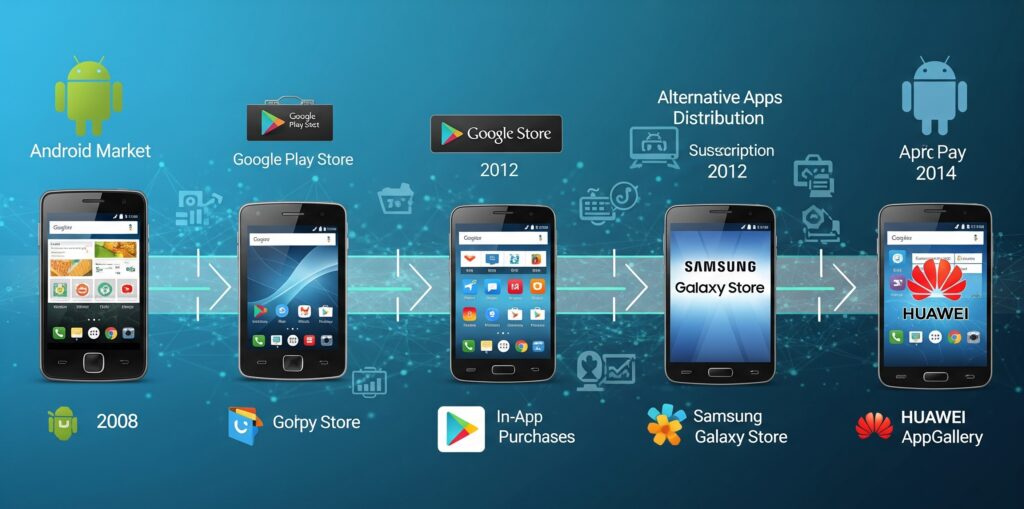Dive into the evolving landscape of Android app marketplaces, the conversation surrounding the Amazon Appstore’s discontinuation, and how the recent launch of iOS 18.6.1 is impacting the mobile market rivalry, trends, and FAQs users often ask.
The world of Android applications is evolving at lightning speed. For years, Google Play Store has been the go-to marketplace for millions of users, but the ecosystem of Android app stores is far broader than many realize. As digital innovation grows, questions about the future of these platforms especially with rumors of appstore android shutdown are generating heated debates across the tech community. At the same time, the newest iOS 18.6.1 update from Apple has once again brought forth comparisons between Android and iOS.
This article takes a deep dive into what lies ahead for Android app stores, the impact of shutdown discussions, and how competitive operating systems like iOS are shaping the app marketplace.
The Evolution of Android App Stores

Since its launch in 2008, the Google Play Store has dominated as the primary distribution hub for Android apps. However, it’s far from being the only option. Platforms like Amazon Appstore, Samsung Galaxy Store, Huawei AppGallery, and several third-party stores have built solid user bases, catering to different needs and markets.
What makes Android unique is its open-source flexibility, giving developers the freedom to create, distribute, and monetize apps without being tied to a single ecosystem. This diversity fosters innovation but also raises questions about security, trust, and long-term sustainability.
The Buzz Around “Appstore Android Shutdown”
One of the trending topics in tech circles is the phrase “appstore android shutdown.” While no official announcements suggest Google Play itself will close, rumors often arise when smaller app stores scale down or when certain regions face regulatory hurdles.
Potential reasons for an Android app store shutdown could include:
- Potential threats: App stores not affiliated with a major platform carry risks of containing malware and unapproved applications.
- Low market share: Lesser-known platforms struggle against Google Play’s dominance.
- Regulatory compliance: Privacy and app approval laws differ by region.
For users, this means staying updated is crucial. Even if one app store closes, alternatives remain accessible, ensuring Android users won’t be left stranded.
iOS 18.6.1: A Competitive Push Against Android
While Android grapples with app store questions, Apple continues to push updates like iOS 18.6.1, which emphasizes privacy, app transparency, and performance upgrades. The contrast between Android’s openness and iOS’s closed ecosystem is sharper than ever.
Key highlights of iOS 18.6.1 include:
- Enhanced app permissions control.
- Faster bug fixes and security patches.
- Improved app compatibility with Apple’s native ecosystem.
This update has sparked comparisons in tech forums, with many asking if Android will adopt similar strategies to strengthen its app marketplace against Apple’s tighter ecosystem.
The Dynamic Future of Android App Stores
The future of Android app stores will likely revolve around three major trends:
- Decentralization – More independent app stores could rise, giving developers new platforms to reach global audiences.
- Security Enhancements – Stronger malware detection and approval systems will become essential to compete with Apple’s reputation for safety.
- Regulatory Influence – Governments are already pushing Google and Apple to allow more competition in app distribution. Europe’s Digital Markets Act (DMA) provides a clear illustration of this.
For developers, this creates both challenges and opportunities. For users, it promises more freedom and choices, provided security concerns are handled responsibly.
FAQs
1. Is Google Play Store shutting down?
No, the Google Play Store is not shutting down. The buzz around “appstore android shutdown” usually refers to smaller or third-party Android app stores ceasing operations.
2.What are the top alternatives to Google Play?
Some reliable alternatives include the Amazon Appstore, Samsung Galaxy Store, Huawei AppGallery, and trusted open-source platforms like F-Droid.
3. Is it safe to download apps outside of Google Play?
It can be safe if you use trusted app stores. However, downloading from unknown sources increases the risk of malware and security breaches.
4. How does iOS 18.6.1 affect Android users?
Indirectly, it increases competition. Apple’s privacy-focused updates may push Android app stores to improve user trust, transparency, and security.
5. Will Android ever limit third-party app stores like Apple?
Unlikely, since Android thrives on openness. However, stricter security checks may be introduced in the future.
Conclusion
The journey of Android app stores is far from over—it’s entering a transformative phase. While rumors of appstore android shutdown stir uncertainty, the reality is that Android’s open nature ensures flexibility, resilience, and choice. Concurrently, Apple’s latest iOS 18.6.1 update is pushing the boundaries of privacy and performance, thereby escalating the rivalry between the two technology leaders..
In the end, users stand to benefit the most. Whether through Google Play, Amazon Appstore, or emerging alternatives, the dynamic future of Android app stores promises greater innovation, better security, and broader global access